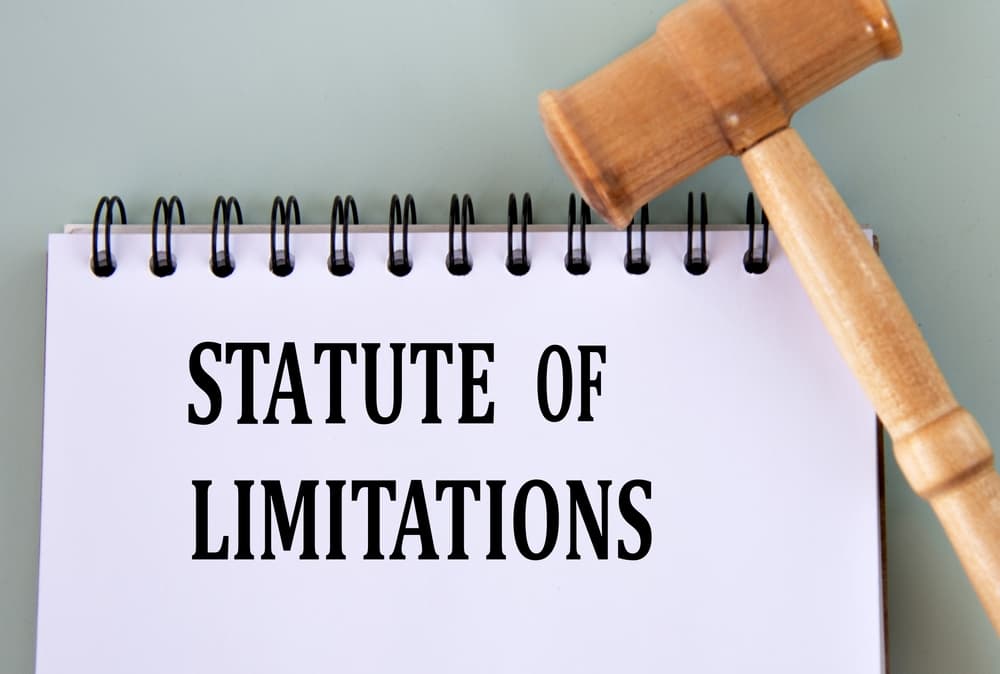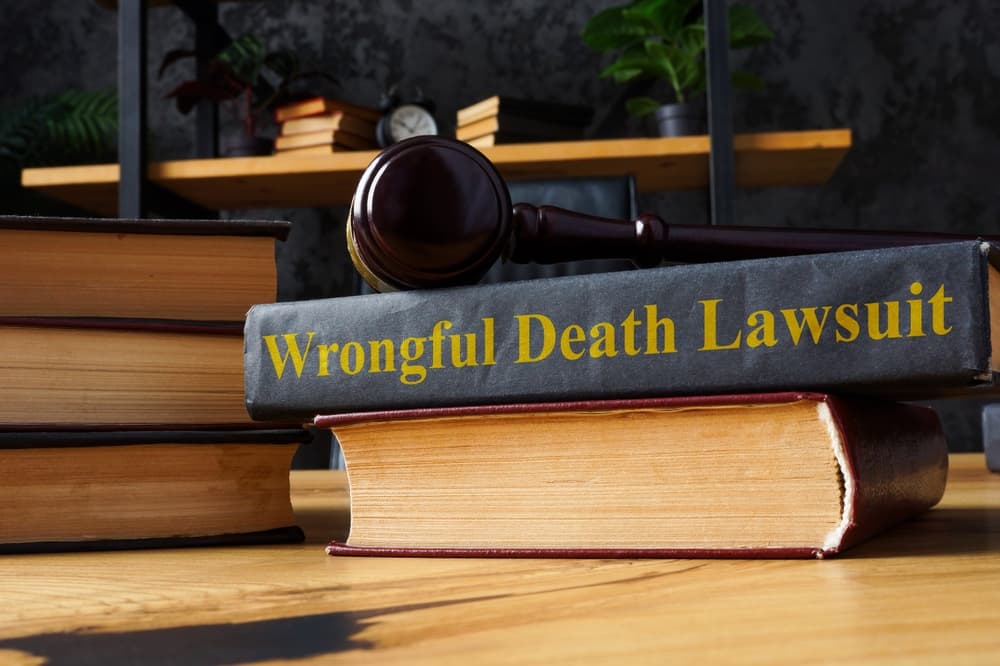
A wrongful death happens when someone loses their life in an accident caused by another person or entity’s negligence. It is among the most serious and heartbreaking civil lawsuits. A wrongful death attorney fights for families devastated by a loved one's accidental death, securing the financial recovery they need to move forward.
Every lawsuit is subject to the statute of limitations. If a family decides to pursue a wrongful death lawsuit, then they must comply with the statute of limitations or risk losing their right to recover. Working with a wrongful death lawyer ensures you comply with this and other important procedural rules when filing a claim.
In this article, we will discuss the statute of limitations for wrongful death lawsuits, how to file a wrongful death lawsuit, compensation, and how an attorney can help protect your legal rights after losing someone in a wrongful death accident.
If you have lost a loved one in a wrongful death accident, contact an attorney today to protect your legal rights. Your attorney will guide you in taking the necessary steps to rebuild your life. Receiving financial compensation cannot replace the loss, but holding the party responsible can provide a sense of justice for your family.
Continue reading to learn more.
What Is The Statute of Limitations For a Wrongful Death Lawsuit?
 A statute of limitations is a deadline set by state law to file a lawsuit if your family is seeking damages after losing someone in an accident. Wrongful death laws vary by state, so having a lawyer helps ensure you do not miss any important deadlines.
A statute of limitations is a deadline set by state law to file a lawsuit if your family is seeking damages after losing someone in an accident. Wrongful death laws vary by state, so having a lawyer helps ensure you do not miss any important deadlines.
Generally, most states allow two to three years from the descendant’s death to file a lawsuit for compensation. However, some states only allow one year from the death while other states allow up to six years. These wide ranges for the statute of limitations make having a legal team even more beneficial for families seeking compensation.
Medical negligence, such as misdiagnosis, failure to prescribe medications or surgical mistakes, may come with even shorter deadlines for filing a lawsuit.
If a negligent government entity caused the death, then the family might have stricter rules to follow and must submit to a different procedure than other wrongful death cases.
Failing to file within the statute of limitations can result in losing your right to pursue a claim. Meeting this deadline is vital. The statute of limitations is subject to very few exceptions, which we will discuss later in this article.
Statutes of limitations exist to require victims to seek compensation for their losses within a specific timeframe. They also promote fairness and efficiency in the legal system, protecting defendants from stale claims. Statutes of limitations also promote judicial efficiency and protect the integrity of justice.
Are There Exceptions to the Statute of Limitations?
Yes, there are exceptions to the statute of limitations in a wrongful death case, but they are few. Statutes of limitations are restrictive, but some states may extend the deadline under the following theories:
Discovery Rule
The discovery rule might apply and extend the time for the statute of limitations. Under the discovery rule, the statute of limitations may not begin to run (or does not start) until the family discovers the cause of death. For example, when medical negligence causes a death, the exact cause might not be immediately obvious. Sometimes, a medical mistake may have led to your loved one's death, but the error might only come to light after a thorough investigation.
Wrongful Death Claimant Is a Minor
If a minor loses a parent and has the right to file a wrongful death lawsuit, the court may extend the statute of limitations until the minor reaches legal age. Many states allow the statute of limitations to be tolled (or delayed) until after the minor turns 18. After the minor reaches adulthood, the statute of limitations will be two years after the minor turns 18.
Fraud or Concealment
The responsible party may extend the statute of limitations for a wrongful death claim if they hide or fraudulently conceal facts about the cause of death from the family. Fraudulent concealment may give the family more time to file a lawsuit and seek damages based on their loss. Working with an attorney is invaluable to identify any signs of fraudulent concealment and ensure your family can pursue justice for your loved one.
Government-Related Claims
Negligent government entities might cause fatal accidents. For example, if a loved one passed away in a car accident due to poorly maintained city roads, your family might have a claim against the government. Remember that the time you have to sue might be more restrictive. Many governmental entities might have immunity to lawsuits from citizens. Contact a wrongful dedath lawyer to learn more about your rights if you suspect a governmental entity caused the accident.
Who Can File a Wrongful Death Lawsuit?
 Who can file a wrongful death lawsuit varies based on state law. The purpose of wrongful death lawsuits is to put the decedent’s family back in a similar position financially that they were in before losing their support.
Who can file a wrongful death lawsuit varies based on state law. The purpose of wrongful death lawsuits is to put the decedent’s family back in a similar position financially that they were in before losing their support.
Typically, immediate family members and primary beneficiaries have the right to sue. For example, in most states, the surviving spouse has the primary right to sue for wrongful death. If the descendant was not married at the time of their death, then their biological and adopted children can file a wrongful death lawsuit for financial compensation. If a spouse or children did not survive the descendant, their parents can file a wrongful death lawsuit in most states.
Some states require that the personal representative of the descendant’s estate file a wrongful death lawsuit. If the descendant dies without a will, the court can appoint a personal representative to file a wrongful death lawsuit. If the claim is successful, the court will distribute the monetary damages to the deceased’s heirs.
Other financial dependents, including life partners in other states, may have the right to sue for wrongful death. Unmarried partners, stepchildren, and other individuals who were financially dependent on the deceased may have the right to sue for wrongful death in certain cases.
In more attenuated cases, siblings and grandparents can file a lawsuit if no immediate family exists.
Wrongful death law varies greatly from state to state. You need an attorney experienced in wrongful death law to ensure that you meet the requirements in your state. Do not hesitate to contact a knowledgeable lawyer to protect your family during a trying time. An attorney will guide you through the legal process and explain your options for seeking justice.
How To Protect Your Legal Rights After a Wrongful Death Accident
 Acting quickly is important to protect your rights after a wrongful death. Working with an attorney is the best first step to protect your family’s rights after a fatal accident. Consider taking the following steps if you have lost a loved one in a wrongful death lawsuit. Gathering essential documents and evidence as soon as possible can significantly strengthen your case.
Acting quickly is important to protect your rights after a wrongful death. Working with an attorney is the best first step to protect your family’s rights after a fatal accident. Consider taking the following steps if you have lost a loved one in a wrongful death lawsuit. Gathering essential documents and evidence as soon as possible can significantly strengthen your case.
Consult an Attorney
Speak with an attorney immediately after a wrongful death accident. An experienced attorney will use their knowledge to ensure you take the next best step after losing someone in an accident. They will answer your questions clearly and work with you to build a strong case, increasing the chances of a successful outcome after your loss.
Time is of the essence in a wrongful death claim. Do not hesitate to contact a lawyer to guide you through the wrongful death claims process.
Gather Evidence
Collecting as much evidence as possible after a wrongful death accident is essential. There are many types of helpful pieces of evidence in wrongful death cases, including the following:
Evidence that proves the cause of death, like:
- The official death certificate
- Autopsy report if it states the cause of death
- Medical records if the death resulted from medical malpractice and injuries
Evidence of negligence, including:
- Professional testimony regarding the cause of death
- Obtain a police report if the death resulted from a traffic accident
- Surveillance or dashcam footage
- Witness statements
Proof that the defendant was liable for causing the fatal accident, including pieces of evidence like:
- Employment or business records in cases of workplace accidents
- Proof of defective products
- Company policies and safety records
Proof of financial and emotional distress:
- Evidence of pain and suffering
- Proof of the deceased’s income
- Medical bills and funeral costs
- Loss of inheritance
Legal and Estate Documents:
You should collect evidence regarding the will or estate plan of the deceased. These related documents will help determine how monetary damages should be distributed among the deceased’s heirs if the wrongful death lawsuit is successful. The deceased’s estate plan might also offer proof of the dependency of plaintiffs claiming financial support.
Working with your attorney ensures you gather the necessary evidence to support your wrongful death claim. An experienced wrongful death lawyer can leverage their resources to collect the indicated evidence and alleviate the burden of procuring accident proof from your family.
Available Compensation After a Wrongful Death Accident
There are various options for compensation available after a wrongful death accident. The goal of a wrongful death case is to repay the family financially. There are three general categories of damages available in a wrongful death accident claim, including the following:
Economic Losses
Economic losses are typically straightforward to identify because they are tangible. Consulting with a wrongful death attorney can assist in identifying all potential losses and ensuring comprehensive coverage during settlement or following a lawsuit. Examples of economic losses your family might recover after a wrongful death incident include:
- Funeral and burial costs
- Loss of the deceased’s income
- Hospital bills for treatment before death
- Emergency room costs, surgeries, or ICU care
- Medication and rehabilitation expenses if the deceased received treatment before passing away
- Projected future earnings that the deceased’s dependents might have received if they had survived
- Lost benefits, including health insurance, pensions, or retirement savings
- Loss of household contributions, like childcare, housekeeping, cooking, grocery shopping, or home maintenance
- Loss of inheritance
Non-economic Losses
Non-economic losses include intangible but very real losses that surviving family members might incur after losing a loved one in a wrongful death accident. Examples of non-economic wrongful death damages can include the following:
- Pain and suffering damages. The surviving family members might be entitled to compensation for the physical pain and suffering that the deceased experienced before their death, along with the distress that the family suffered after the deceased’s death.
- The emotional distress of the surviving family members can include grief, depression, PTSD, mental anguish, anxiety, and emotional trauma.
- Loss of companionship and consortium. Surviving family members might be entitled to recover from the loss of love, affection, and emotional support from the deceased.
- Loss of parental guidance and support. The children of the deceased lose moral, emotional, and life guidance for a parent. Courts recognize that parental love, discipline, and care are irreplaceable.
- Loss of enjoyment of life for the surviving family members. Surviving family members may no longer enjoy life the way they did before the wrongful death. Loss of enjoyment of life damages cover the loss of happiness, social interactions, and life fulfillment.
Punitive Damages
Courts award punitive damages in rare cases. A court might award punitive damages in wrongful death cases when the negligent party acted with willful disregard for safety or, in some outrageous way, caused the death. Courts award punitive damages in wrongful death cases to punish the responsible party and deter future misconduct. For example, a company that knowingly ignored safety violations, leading to a worker’s death, might have punitive damages assessed against them.
Contact a Wrongful Death Attorney Today
If your family has lost a loved one due to negligence, legal support is vital. An attorney can guide you through the legal process and pursue the compensation you deserve after such a loss. While compensation can't bring back your loved one, it can aid in rebuilding your life. Start forming your legal team immediately after a wrongful death. Contact a reputable personal injury law firm in St. Louis, MO today.





 RSS Feed
RSS Feed